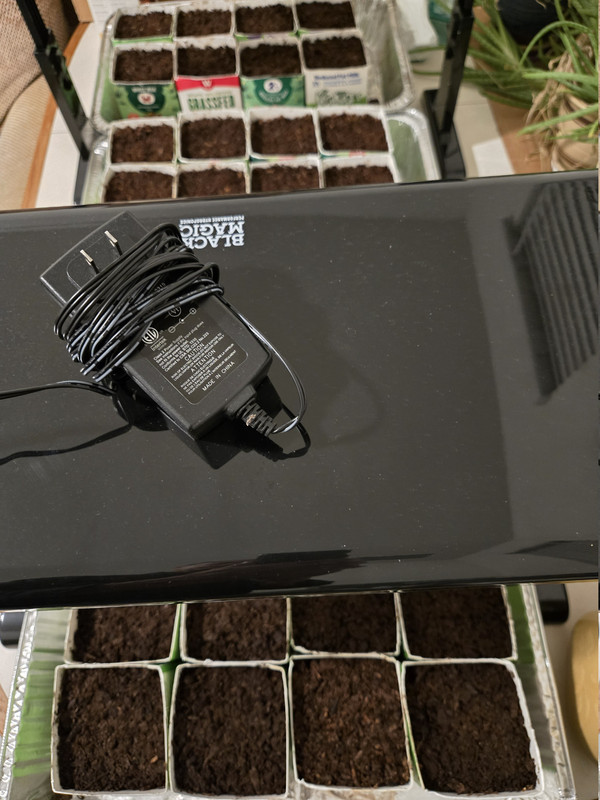by Higgenbotham » Mon Jan 12, 2026 12:48 am
Higgenbotham wrote: Fri Jan 09, 2026 3:10 pm
At this point, we are close enough to collapse that preparing for collapse seems more important than trying to figure out the when and how.
Yesterday I started my tomatoes indoors.
Last year, I didn't want to spend much money until the garden proved itself out. Turned out I harvested about 200 pounds of tomatoes despite some severe flooding in early July which reduced my crop substantially. How much reduction is hard to say, but maybe half. That was good enough to justify spending some money. We're still using sauce but will probably run out this month. So I invested in a couple grow lights shown in the photo below ($150). Also bought 1,000 seeds of a variety that grew well ($94) and is known to be very disease resistant, which might be necessary if the same ground is used year after year.
However, I'm hoping that an heirloom variety that someone told me worked just as well here will eventually be what I use. He harvested 30 pounds per plant last year. That way I can save the seeds. So I'm trying those at a cost of $8 for about 27 seeds from the same source he used.
As far as the grow lights, I downloaded an app that measures something called ppfd which essentially measures how much light a seedling gets. Winter light supposedly will not give a seedling enough light but I suspect that is not entirely correct. There's a lot of bad information out there and I can be sure my grandmother in rural Nebraska wasn't using grow lights. But I can't ask her because she's been dead for 35 years and is the last one in my lineage who knew how to do this. Hopefully, I can find a very old person around here who knows. I'll also be exploring alternatives to using grow lights such as outdoor cold frames but that's for another day.
As mentioned, I am trying to use as little plastic as possible in the garden. You see the paper milk cartons in the picture below. Problem is, I belatedly discovered that those paper milk cartons are not just paper, they are coated inside and out with a thin layer of polyethylene. So back to the drawing board on that one. I thought they were coated with wax, but that was only true decades ago. I read the wax was discontinued sometime in the 1940s. Also, paper cups and paper plates are coated with polyethylene and those cardboard oatmeal containers have a thin sheet of plastic in them too. I discovered that years ago when I put one of them in a worm bin to decompose it.
I'm willing to go high tech if it pays out but also want to know how to dial it back to dark age tech if need be.

[quote=Higgenbotham post_id=93164 time=1767985816 user_id=100]
At this point, we are close enough to collapse that preparing for collapse seems more important than trying to figure out the when and how.[/quote]
Yesterday I started my tomatoes indoors.
Last year, I didn't want to spend much money until the garden proved itself out. Turned out I harvested about 200 pounds of tomatoes despite some severe flooding in early July which reduced my crop substantially. How much reduction is hard to say, but maybe half. That was good enough to justify spending some money. We're still using sauce but will probably run out this month. So I invested in a couple grow lights shown in the photo below ($150). Also bought 1,000 seeds of a variety that grew well ($94) and is known to be very disease resistant, which might be necessary if the same ground is used year after year.
However, I'm hoping that an heirloom variety that someone told me worked just as well here will eventually be what I use. He harvested 30 pounds per plant last year. That way I can save the seeds. So I'm trying those at a cost of $8 for about 27 seeds from the same source he used.
As far as the grow lights, I downloaded an app that measures something called ppfd which essentially measures how much light a seedling gets. Winter light supposedly will not give a seedling enough light but I suspect that is not entirely correct. There's a lot of bad information out there and I can be sure my grandmother in rural Nebraska wasn't using grow lights. But I can't ask her because she's been dead for 35 years and is the last one in my lineage who knew how to do this. Hopefully, I can find a very old person around here who knows. I'll also be exploring alternatives to using grow lights such as outdoor cold frames but that's for another day.
As mentioned, I am trying to use as little plastic as possible in the garden. You see the paper milk cartons in the picture below. Problem is, I belatedly discovered that those paper milk cartons are not just paper, they are coated inside and out with a thin layer of polyethylene. So back to the drawing board on that one. I thought they were coated with wax, but that was only true decades ago. I read the wax was discontinued sometime in the 1940s. Also, paper cups and paper plates are coated with polyethylene and those cardboard oatmeal containers have a thin sheet of plastic in them too. I discovered that years ago when I put one of them in a worm bin to decompose it.
I'm willing to go high tech if it pays out but also want to know how to dial it back to dark age tech if need be.
[img]https://i.postimg.cc/m2pVYmKk/20260111-220545.jpg[/img]